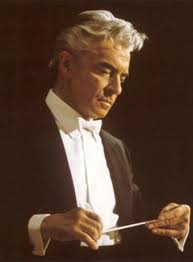
Decided to make a separate post about Norman Lebrecht after posting his comments on Susan Boyle. Norman Lebrecht is someone I recently discovered as I developed an interest in the late classical music conductor Herbert Von Karajan, and found that Lebrecht is the leader of a pack of wolves who seem to have set themselves to destroy the man's reputation both in life and death.

Karajan was born in 1908 in Austria and lived through the Nazi era as conductor of orchestras in the German towns of Ulm and Aachen. In the fifties, well after the war, he became world-famous as the conductor of the Berlin Philharmonic. It was partly his charisma as a conductor, which can be seen in You Tube videos of various performances, and partly the fact that he had such enemies as Lebrecht, who rarely have a good word to say about him or his music, that made me want to know more about him. As I read about Karajan my admiration for him as a musician and as a personality only grew, and Lebrecht has become to me the embodiment of a virulent destructive form of Political Correctness as he multiplied nasty epithets against the man as a supposed "Nazi," which he wasn't.
I read enough to understand that Karajan joined the Nazi party in 1933, as a young man in his twenties just starting out as a conductor, because he was asked to, but although a membership number was issued the membership didn't go through for some reason, and he never pursued it or bothered to find out why. He was completely apolitical and completely involved in his career and the Nazis were just an obstacle to be gotten around. He also had no clout he could have used to confront them such as some older conductors and musicians had and used, although his not protesting is unfairly held against him by his merciless critics. He would simply have lost his job -- and his musical ambitions utterly dominated his life and eclipsed every other interest. Before he got the post in Aachen he even went through a period of near-starvation for lack of work.
Two years after the first attempt at membership, he was again asked to join the party --
obviously because he was
not a member despite the earlier gesture in that direction -- and this time the membership went through. But some will say he's
REALLY REALLY REALLY a Nazi because he "joined the party two times" which is ridiculous from any point of view and just shows how eager they are to make him into a villain for some reason. The fact that he never uttered a pro-Nazi word in his life or joined in any of their causes escapes these hateful fingerpointing slandermongers. He played for state events on occasion but never participated in anything but musical events. Hitler in fact, oddly perhaps, hated him from the time a singer missed his cue in an opera Karajan was conducting and the performance never recovered. Karajan's career subsequently suffered from Hitler's dislike of him, which increased when he married a woman with a Jewish grandparent. He was blocked from many career advancements he might have had otherwise. The idea that he was ever in any sense at all a Nazi is evil slander.
Norman Lebrecht is not one of my favorite people for this reason, so I was surprised to find myself appreciating his comments about Susan Boyle. But perhaps I'm fairer to him than he is to Von Karajan.
I don't know exactly what Lebrecht's role is in all this, though he seems to be the leader of the pack, but at least he is one of the more vocal denouncers of Karajan. He seems to hate everything about him and I've found the same attitude in others across the internet. There were pickets against Karajan's appearing in the US the few times he was here, with signs calling him a Nazi. Political Correctness run amok, out to destroy an individual who far from deserving the epithet suffered in his own way under the Nazis. Despicable. The same mentality is also directed against Karajan's young protege the violinist Ann-Sophie Mutter, apparently simply because she was his protege though the charge is that she asks too much money for her performances. The clue is that they call her names as they do Karajan ("The fiddler" is their put-down for her).
The singer Elizabeth Schwarzkopf is also spoken of the same way. Apparently she did join in some Nazi organizations when she was a young girl. The zeal with which people are persecuted for their attraction to something that seemed patriotic and wholesome at the time, as if they should have been able to recognize that the Nazis were murderers at that stage, as if they could see into the future, is to my mind as deplorable a human tendency as Nazism itself. Some did recognize the true nature of Nazism quite early; others were swept along with the emotionally charged atmosphere of patriotic fervor.
It happens. I think it's happening in America right now in different enough form to camouflage its basically fascistic character, with people swept up in an emotional embrace of a leader who is not what he seems to them, despite much evidence already that he got into power through deception, and will most probably be the destruction of this country as Hitler was of Germany. This time it's the people who are the most vociferously anti-fascistic fingerpointers who are supporting the real fascists.
=========
Here's a link to a column by Lebrecht about Karajan. His focus is his music but one has to suspect his judgment is clouded by his belief that he was a Nazi. Here he is passing on the false rumor about his role in Nazi Germany:
On Hitler's rise in 1933 he joined the Nazi party not once but twice and was rewarded with a post at Aachen, the youngest music director in the Reich. Before long he was hailed by the Goebbels-controlled press as "Das Wunder Karajan" – the Karajan Miracle – in contrast to the politically unreliable Wilhelm Furtwängler. Karajan learned from Goebbels how to play one man against another, among other black political arts. He strutted his stuff in occupied Paris and Amsterdam, to all effects the Nazi poster boy.
I read Richard Osborne's biography of Karajan that made it clear that not only is the idea he was a Nazi false -- far from bring a "Nazi poster boy" he was hated by Hitler because of a botched performance, and career advancements were blocked for that reason as well as his marriage to a one-quarter Jewish women -- but such judgments about his music are false as well. He already HAD the post at Aachen too, he wasn't "rewarded" with it, though it would have been threatened if he had not joined the party -- the second time in this case. And really, how ridiculous is it to think of someone joining the party twice as proof of great zeal for it? The only way that could possibly have happened is if the first membership hadn't gone through, and the only way THAT could possibly have happened is if Karajan had no interest in party membership, didn't participate in anything that would have required proof of it, and didn't bother to be sure it was legitimate. Also, although Hitler hated him, the music press thought he was great, and perhaps Goebbels did as well, but there is no evidence that the music critics were influenced by the political leaders.
The music critic, Lebrecht, however, is clearly influenced by his own political beliefs. That diatribe against Karajan has just about no correspondence to the reality of Karajan's life or musical achievements, but such a smear will of course stick unless it's countered by the truth. Lebrecht ought to read Osborne.
 Wright was a Unitarian, an apostate by the standard of a Bible-believing Christian, a self-styled "free thinker" of a sort that abounded in the late 19th and early 20th centuries, quite willing to pontificate for the benefit of all on whatever he happened to be thinking about (kind of like me in my blogs I suppose).
Wright was a Unitarian, an apostate by the standard of a Bible-believing Christian, a self-styled "free thinker" of a sort that abounded in the late 19th and early 20th centuries, quite willing to pontificate for the benefit of all on whatever he happened to be thinking about (kind of like me in my blogs I suppose).

 Twain for most of his life had a vague idea that there was a God but he did nothing to get to know Him, and when tragedy struck he ended up denying that God exists because the God he'd so vaguely had in mind had turned out not to be much like the true God. One of the commentators said it was because he so much "wanted to believe" that he became so violent against "the Christian God" at the end. This happens to many and nobody bothers to explain that it makes no sense. They get an idea in their head that a "good" God wouldn't allow bad things to happen, having no idea what the Biblical explanation for evil is. Their own imagination becomes the standard for judging God and that's the end of that.
Twain for most of his life had a vague idea that there was a God but he did nothing to get to know Him, and when tragedy struck he ended up denying that God exists because the God he'd so vaguely had in mind had turned out not to be much like the true God. One of the commentators said it was because he so much "wanted to believe" that he became so violent against "the Christian God" at the end. This happens to many and nobody bothers to explain that it makes no sense. They get an idea in their head that a "good" God wouldn't allow bad things to happen, having no idea what the Biblical explanation for evil is. Their own imagination becomes the standard for judging God and that's the end of that.


